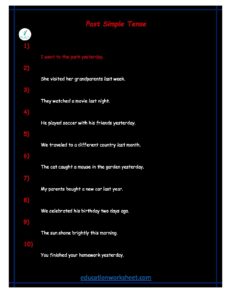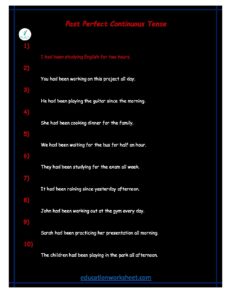2: how to converting Past Simple Tense positive sentences to interrogative form
how to converting Past Simple Tense positive sentences to interrogative form
Table of Contents:
- Understanding Past Simple Tense
- The Basics of Forming Interrogative Sentences
- Using the Auxiliary Verb “Did”
- Questions with Regular Verbs
- Questions with Irregular Verbs
- Questions with To Be
- Questions with Modal Verbs
- Negative Questions
- Wh-Questions
- Tag Questions
- Practice Exercises
- Conclusion
1. Understanding Past Simple Tense
Before we delve into converting past simple tense sentences into interrogative form, let’s briefly review what past simple tense is. Past simple tense is used to describe actions or events that occurred in the past and are now completed. In its positive form, it typically consists of the base form of the verb with an -ed ending for regular verbs (e.g., “played,” “worked”) or an irregular verb conjugation (e.g., “went,” “saw”). For example:
- I visited Paris last summer. (Regular verb)
- She ate dinner at 7 PM. (Irregular verb)
2. The Basics of Forming Interrogative Sentences

In English, interrogative sentences are formed by changing the word order or adding an auxiliary (helping) verb. For past simple tense questions, we often use the auxiliary verb “did” along with the base form of the main verb. The basic structure of an interrogative sentence in the past simple tense is:
Did + Subject + Base Form of Verb + Rest of the Sentence?
Now, let’s break down each part of the structure:
- Did: This is the past simple tense form of the auxiliary verb “do.” It remains constant in all interrogative sentences.
- Subject: This is the person or thing performing the action. It comes after “did.”
- Base Form of Verb: This is the base (infinitive) form of the main verb, without any tense markers (e.g., -ed).
- Rest of the Sentence: This includes the rest of the sentence, which can consist of various elements like objects, adverbs, and so on.
3. Using the Auxiliary Verb “Did”
The auxiliary verb “did” is crucial when converting past simple tense positive sentences into interrogative form. It serves as an indicator that the sentence is a question and also helps with subject-verb inversion (changing the order of the subject and verb). “Did” does not change based on the subject; it remains the same for all subjects (I, you, he, she, it, we, they). Let’s see how this works in practice:
Positive Sentence: He watched the movie.
Interrogative Form: Did he watch the movie?
In this example, we used “did” at the beginning of the sentence and inverted the subject “he” and the base form of the verb “watch” to create an interrogative sentence.
4. Questions with Regular Verbs
Regular verbs in the past simple tense form questions by adding “did” at the beginning and using the base form of the verb. Here are some examples:
- She visited London. (Positive)
- Did she visit London? (Interrogative)
- They worked hard. (Positive)
- Did they work hard? (Interrogative)
5. Questions with Irregular Verbs
Irregular verbs do not follow the -ed pattern for past tense. Instead, they have unique forms. When forming questions with irregular verbs, you still use “did” but use the base form of the irregular verb. Here are examples:
- He ate breakfast. (Positive)
- Did he eat breakfast? (Interrogative)
- We went to the beach. (Positive)
- Did we go to the beach? (Interrogative)
6. Questions with “To Be”
The verb “to be” (am, is, are, was, were) is unique in forming questions. Instead of using “did,” you directly invert the order of the subject and “to be.” Here’s how it works:
- They were at the party. (Positive)
- Were they at the party? (Interrogative)
- She was tired. (Positive)
- Was she tired? (Interrogative)
7. Questions with Modal Verbs
When forming questions with modal verbs (can, could, will, would, shall, should, may, might, must), you also use “did” to indicate the question. The modal verb comes after “did.” For example:
- She can swim. (Positive)
- Did she can swim? (Incorrect)
- Did she can swim? (Interrogative)
Note that modal verbs do not change their form, so you use them as they are.
8. Negative Questions
Negative questions are questions that include a negation such as “not” or “never.” To form negative questions, you use “did not” (didn’t) instead of just “did.” Here’s the structure:
Didn’t + Subject + Base Form of Verb + Rest of the Sentence?
For example:
- He didn’t visit the museum. (Negative)
- Didn’t he visit the museum? (Negative interrogative)
- They didn’t work yesterday. (Negative)
- Didn’t they work yesterday? (Negative interrogative)
9. Wh-Questions
Wh-questions are a type of interrogative sentence that begins with question words like who, what, when, where, why, and how. To form past simple tense wh-questions, you use the same structure as regular interrogative sentences (using “did”), but you include the question word at the beginning. Here are some examples:
- She visited her grandmother. (Positive)
- Where did she visit? (Wh-question)
- They played basketball. (Positive)
- What did they play? (Wh-question)
10. Tag Questions
Tag questions are short questions added at the end of a statement to confirm or seek agreement. To form tag questions in past simple tense, you use the same auxiliary verb as in the positive sentence but in a negative form if the statement is positive, and in a positive form if the statement is negative. Here’s the structure:
- Positive Statement: You watched the movie, didn’t you? (Tag question)
- Negative Statement: You didn’t watch the movie, did you? (Tag question)
Now that we’ve covered the basics of converting past simple tense positive sentences to interrogative form, let’s move on to some practice exercises to solidify your understanding.
how to converting Past Simple Tense positive sentences to interrogative form
11. Practice Exercises
Exercise 1: Convert the following positive sentences into interrogative form:
- They played soccer.
- She visited her grandparents.
- He watched the news.
- We studied for the exam.
- I cooked dinner.
Exercise 2: Convert the following negative sentences into negative interrogative form:
- They didn’t finish their homework.
- She didn’t go to the party.
- He didn’t eat lunch.
- We didn’t see the movie.
- I didn’t like the book.
Exercise 3: Form wh-questions using the given statements:
- He ate breakfast.
- They visited the zoo.
- She watched a movie.
- We traveled to Paris.
- I read a book.
12. Conclusion
In this comprehensive guide, we’ve covered the essential techniques and examples for converting past simple tense positive sentences into interrogative form. You’ve learned the importance of using the auxiliary verb “did,” subject-verb inversion, and how to handle regular, irregular, “to be,” and modal verbs. Additionally, we explored negative questions, wh-questions, and tag questions.
By practicing these concepts and exercises, you’ll become more proficient in forming interrogative sentences in the past simple tense. Keep practicing, and you’ll master this important aspect of English grammar.
how to converting Past Simple Tense positive sentences to interrogative form

how to converting Past Simple Tense positive sentences to interrogative form Unlock the secrets of converting Past Simple Tense positive sentences to interrogative form with our engaging and interactive worksheets. Master grammar effortlessly and boost your language skills while exploring the world of questions in English. Get started today and watch your confidence soar

